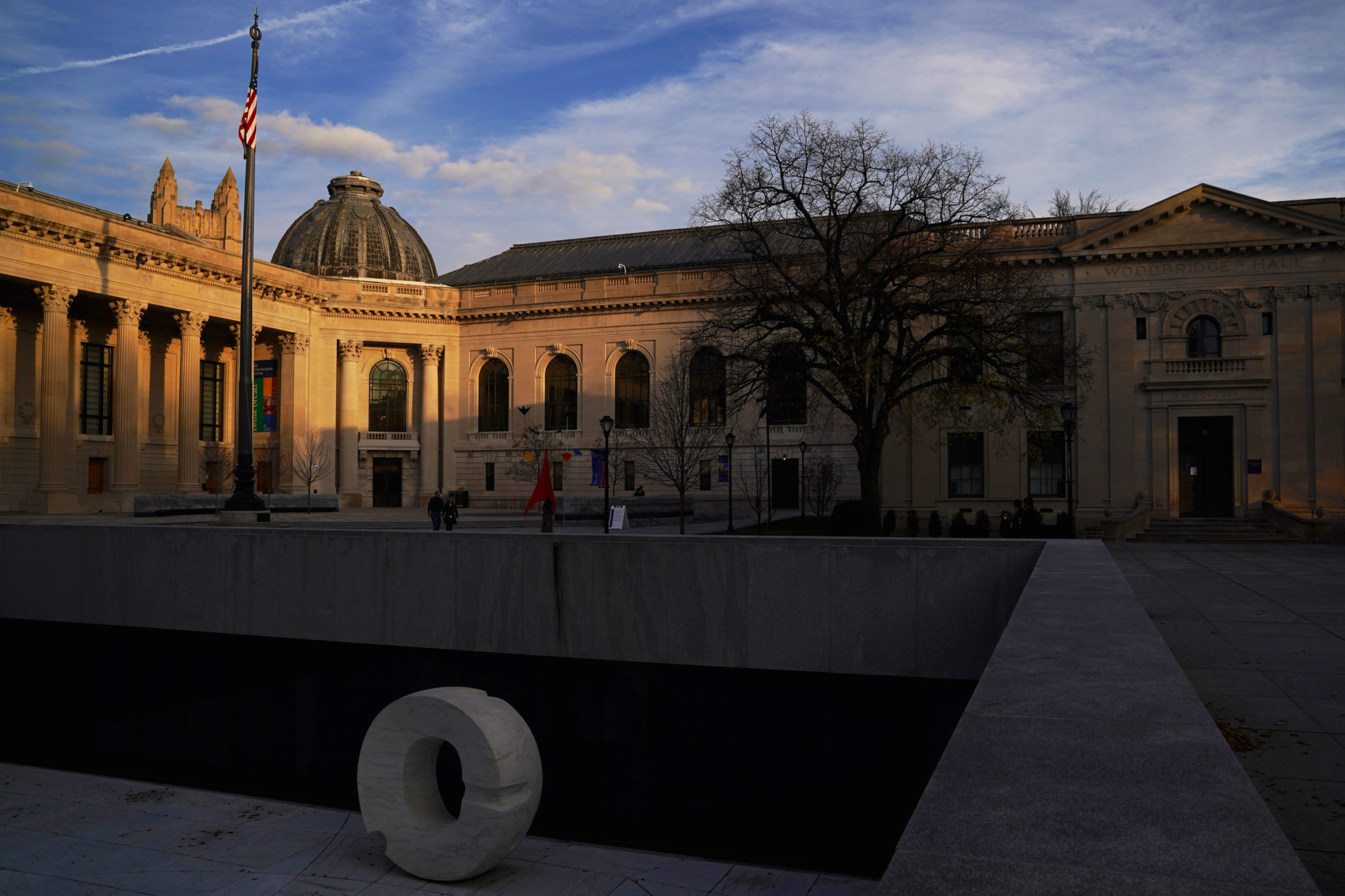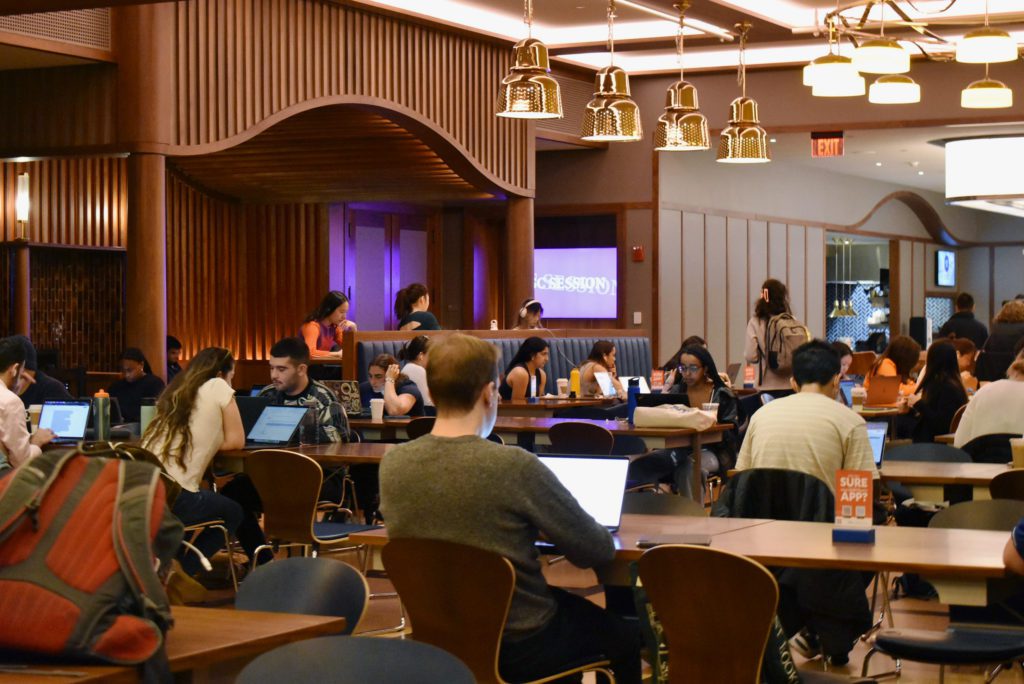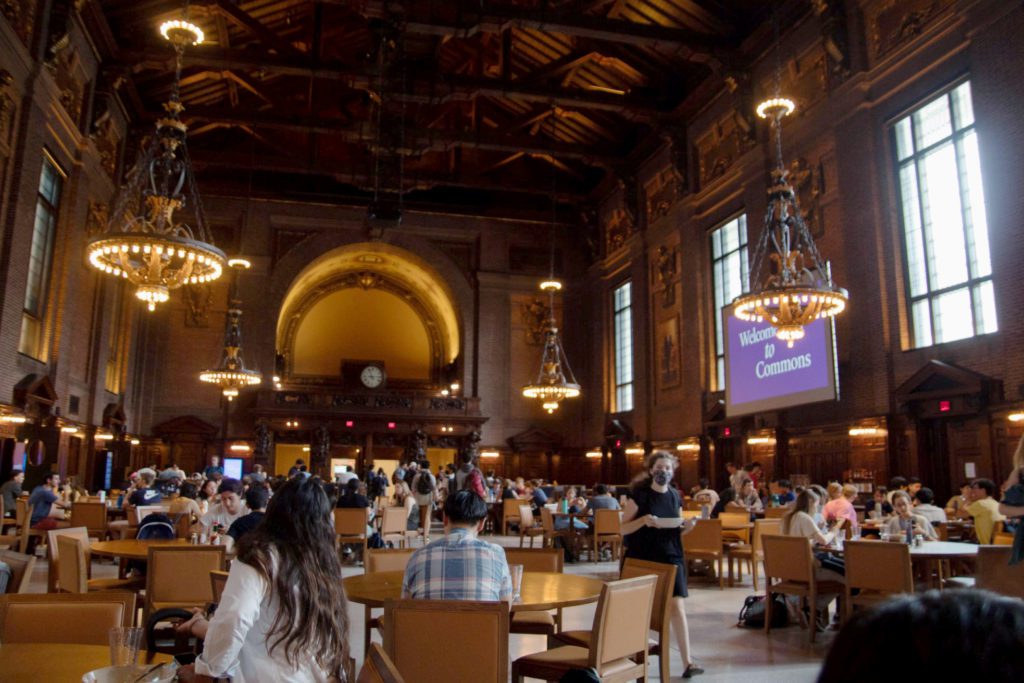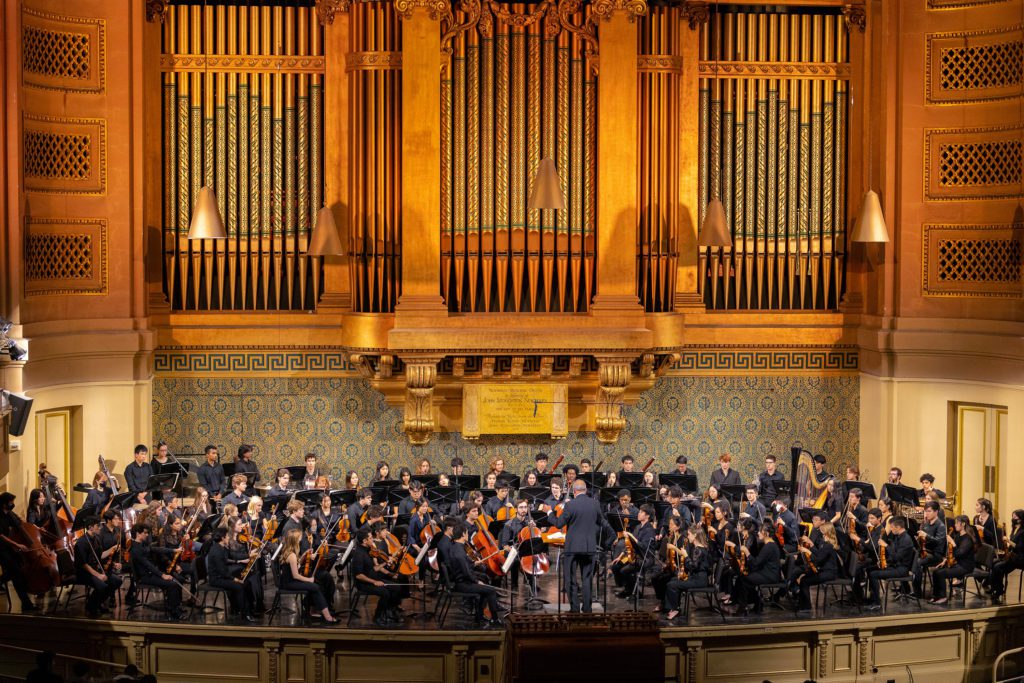The Schwarzman Center, one year in
The University’s grand vision for a centralized campus hub has been well-received by undergraduates in Yale College and many in the arts community. Some graduate and professional students, meanwhile, say they have felt left out.

Zoe Berg, Senior Photographer
A year after the Schwarzman Center opened its doors to the Yale community, students remain divided on whether the Center has achieved its vision for a more unified Yale.
The Schwarzman Center, which was founded by a $150 million donation by Stephen Schwarzman ’69, was designed to become a “transformational” campus center through the renovation of the University’s Commons and Memorial Hall spaces. Schwarzman’s gift was, at the time, the second-largest single donation in Yale’s history.
“So much of the educational experience at Yale takes place outside the classroom,” Salovey said upon announcing Schwarzman’s gift in pursuit of a campus center in 2015. “But until now, Yale has lacked a central gathering space that can serve as a locus — and a catalyst — for students from every part of Yale to interact with one another. We thank Steve Schwarzman for his vision and support in helping us advance our vision of a more unified, accessible and innovative university.”
Salovey’s comments, seven years ago, are in line with his inaugural promise to transform Yale into a more “interdependent community.” Today, the Schwarzman Center offers dining services as well as arts and study spaces, and hosts a range of student fairs and live performances.

The News spoke to students across the undergraduate and graduate student bodies to gauge an understanding of just how far the center has come towards achieving this promise. While some appreciate its emphasis on the arts and community-building, others, especially graduate students from non-art-centric schools, call for greater inclusivity and diversity in Schwarzman Center programming.
For Aranyo Ray ’25 and Yale College Council Senator Viktor Kagan ’24, the center and its breadth of resources have been an integral part of their Yale experience thus far.
Kagan described the center as a “gathering space,” saying that he regularly goes there to eat, study, see performances and meet friends and professors.
In a similar vein, Ray, who often takes advantage of the Good Life Center and the dining services at Commons, told the News that the center has afforded numerous opportunities for him to meet people from various backgrounds and class years.
“The atmosphere of Schwarzman creates a space designed to inspire not only artistry, but also pride in taking care of oneself,” said Coco Ma ’25, who also graduated from the School of Music in 2022. “Out of all the spaces on campus, I spend the most time at Schwarzman. The variety of spaces, both old-world and modern, the friendly staff and the many options for food have really allowed me to produce some of my best work.”

However, for others, this vision holds more truth in theory than in physical execution.
“My first impression of the Schwarzman Center was that it was a beautiful building from the exterior, and well-renovated in the interior,” said William Zhang SPH ’24. “I heard that this is where the First Year Formal is, and I hope that our school could also have events in a venue such as this.”
Zhang added that while he and his fellow graduate students receive regular emails from the Good Life Center about programming and various events hosted at the Schwarzman Center, there exists a general sentiment that the University’s opportunities, especially in terms of social and club activities, cater more to Yale College students.
He explained that this year, the School of Public Health did not have a general activities fair: only a school-specific one. Meanwhile, Yale College’s 2022 Extracurricular Fair, which took place at the Schwarzman Center earlier in September, broadcasted clubs from a variety of academic disciplines and interests.
This year being his first at Yale, Zhang has only visited the Schwarzman Center twice: once to drop off a COVID-19 test and the second to attend a meeting for a club. He said that he sees himself going to more events and taking advantage of the Good Life Center’s resources more often in the future. He added that the Well, a student bar in the Underground, is an exciting prospect to increase graduate student engagement.
Nick Fisk GRD ’23 and Faith Mpara SOM ’22 echoed that the current services provided cater more to student life within Yale College and campus interest groups reflecting specific disciplines, which they attributed to inconsistent advertising and communication throughout the University’s different schools.
Fisk, who serves as president of the Graduate and Professional Schools Senate, explained that for graduate and professional students, this past year has seen a “lack of clarity and enthusiasm about the [Schwarzman] center.”
But he was also sympathetic to the Center’s efforts. He noted that those involved with the Schwarzman Center are working hard to involve graduate and professional students within the space, but feared that a murky “masthead” caused a slow and piecemeal launch that limited the involvement of these students.
“Many folk don’t know what it’s for and what programming, services, and opportunities are there,” Fisk wrote in an email to the News.

Like Fisk, Mpara also stressed the need for greater and more regular broadcasting of the Schwarzman Center’s services, especially to those whose academic and extracurricular pursuits are not directly intertwined with the center’s heavy emphasis on the arts. For Mpara, the Schwarzman Center is, in theory, a representation of the vibrant and multidisciplinary facets of student life, but falls short in living up to that image.
“It just looks like a place where people go and get food,” Mpara said. “It would be valuable to highlight what else students could use it for, and perhaps more than once. For new [School of Management] students, we were only given the opportunity to tour it once during orientation back in the beginning of the year.”
Fatima Al-Kuwari MFA ’25 and Aylin Alakbarli MFA ’25, though agreeing that the Schwarzman Centers’s prioritization of the arts has been a privilege for themselves and their fellow arts graduate students, also emphasized the importance of integrating the undergraduate and graduate student bodies.
Workshops and interactive social gatherings — rather than just talks and moderated panels — might fill in some of the existing gaps and help foster a more intimate relationship between the center and its visitors, Al-Kuwari added.

Looking to the future, Fisk is hopeful that Rachel Fine, the incoming executive director of the center to whom he spoke to about the lack of graduate and professional school engagement, would work to address these concerns and help in the creation of a Schwarzman Center that is both as transformational and equitable as it hopes to be.
Even for some Yale College students, however, the Center has yet to achieve its intended vision of a “one Yale” experience.
“To be honest, I thought it was just a place to get fancy food and go to fancy events my first year,” Joanna Ruiz ’25 said. “I didn’t really see it as an ‘artistic’ or ‘cultural’ hub more than I saw it as a grandiose display of Yale’s wealth.”
Ruiz added that though the programming visibly caters more to undergraduates, the center is far from “becoming what Yale intended it to be” in the realm of student life.
However, Ruiz is hopeful that with loosened COVID-19 restrictions and the opening of new spaces, the Center will cater more to both graduate and Yale College students, moving one step closer to bridging the University’s diverse student communities.
Maurice Harris, who serves as director of marketing and communications at the Schwarzman Center, told the News that the Center was “committed” to serving students across all of Yale’s schools and colleges. He added that there are students from across the University, including the School of Drama, the School of Public Health and the School of Architecture, in its “student staffing model.”
“This kind of behind-the-scenes engagement helps to drive awareness about the Center organically, even beyond our newsletter, website and social media channels, and helps ensure that students remain at the heart of the Center’s ongoing development,” Harris wrote in an email to the News.
The buildings which hold Commons and Memorial Hall were built in 1901.







